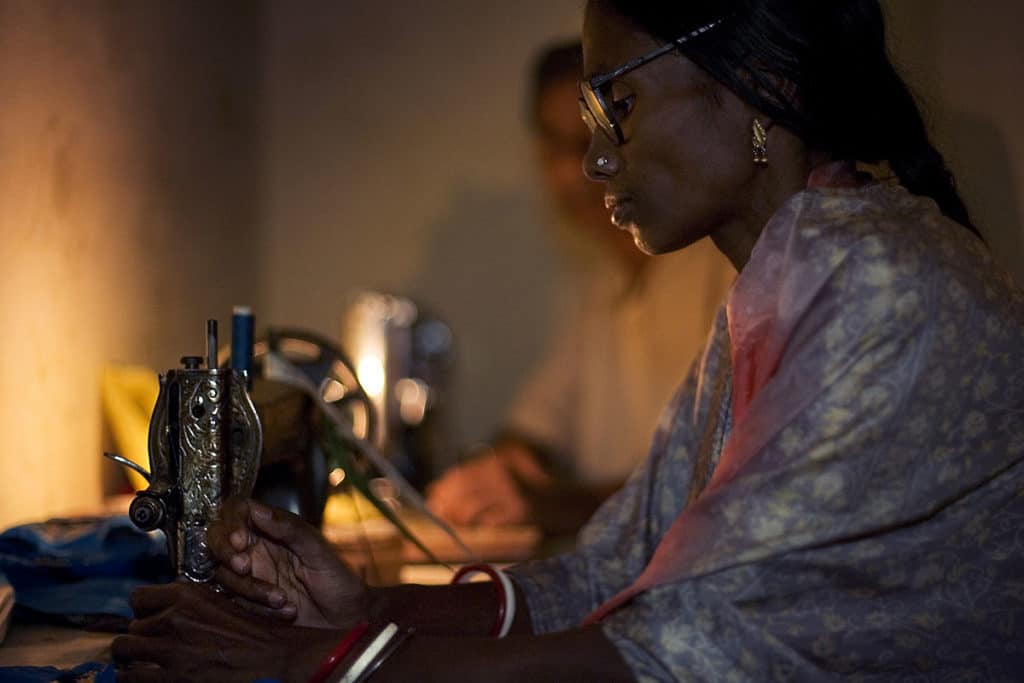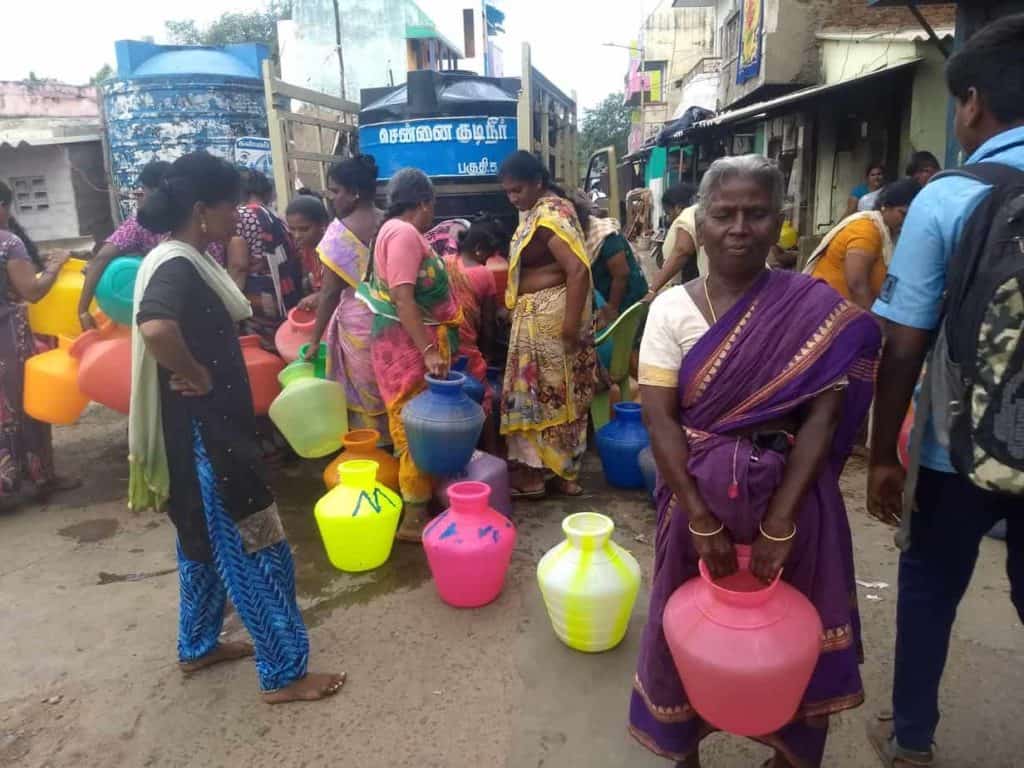India’s rapid urbanization has led to a significant rise in informal urban settlements, with over 35% of the country’s urban population occupying them. Characterized by makeshift infrastructure and poor hygiene conditions, these settlements are often the only affordable option for people who also work unsteady, non-contractual jobs. Women in these informal settlements, in particular, play a huge role in protecting the physical and financial health of their families.
Under the shadow of potential eviction and financial struggles, these women are almost always engaged in labour — both paid and unpaid. In many cases, their homes — comprising single rooms for a family — are their workspaces too. Such unending work ensures that women are constantly kept away from rest, leisure and even full focus on paid work due to the constraints of care-work and running a household in an informal settlement. This leads to time poverty, exhaustion and poor health.
In this interview, Bijal Bhrambhatt, Director at Mahila Housing SEWA Trust, elaborates on how the infrastructure of these informal urban settlements and access to services plays a huge role in creating such conditions for women and perpetuating women’s unpaid labour. Bijal’s work spans water, sanitation, access to energy, housing, housing finance, land tenure, and building the capacities of women living in informal housing colonies in Rajasthan, Gujarat, Delhi, Bihar, Jharkhand and Madhya Pradesh.
When you talk of women working and living informally, what exactly does that encompass?
Bijal: So, these are women who don’t have a fixed employer-employee relationship. They are usually self-employed or work on a contract basis with different employers. But here, we’re talking about women from a specific class — women who are mostly poor. And they work as daily wagers, domestic help, vendors, sex workers or home-based workers. Home-based workers refer to women who earn a living by stitching at home or rolling beedis or making kites.
You’ve mentioned that many of these women do home-based work. Do these women face specific issues while using their home as a workspace?
Bijal: So many of the poor use their houses as their workspace. Work from home is a concept that became popular during COVID-19, but for women in the informal sector, a lot of the work they do has always been from their homes. For example, stitching clothes, making kites, rolling beedis — all that work happens from home. And if they are vendors, for example, if they sell paani puris, then the production happens at home and only the sale happens outside.
Here, again, access to services makes all the difference. Not having access to water would mean you have to buy water from outside, which in turn impacts your productivity. If you are selling vegetables, the vegetables that have to be sold the next day are stored in your house, you don’t have a separate storehouse. A home is a production house, it’s a storehouse, it’s an area where you work and live. This is why access to housing and services for the poor is not only a measure of social security, it’s also an economically productive asset.
Read more: These Delhiites always worked from home, but COVID has left them jobless
What are the major concerns that women in these informal urban settlements have on a day-to-day basis?
Bijal: The first concern is survival. That they must earn enough to support their families with food, clothing, healthcare, etc. And the next is that they need to have access to a quality life. Access to water, sanitation, electricity. I think those are the two prime concerns.

There’s a lot of debate on safety as a concern in informal settlements — especially safety for women. Is that an added concern?
Bijal: If you talk of safety in terms of sexual exploitation or violence against women, I don’t think that it’s only the informal settlements that are unsafe. Such things occur routinely across society. The informal settlements are not specifically unsafe in that sense. But in informal settlements, not just women, but all residents may be more exposed or vulnerable to accidents. For example, access to illegal and sub-standard amenities that don’t adhere to safety norms can be detrimental. If you have sub-standard electrical infrastructure, you’re more likely to be electrocuted.
Informal housing also does not adhere to planning or construction norms, which can make it relatively more unsafe to live in during disasters, in comparison to housing for the more privileged. In that sense, it could be unsafe for the general population living there, and not specifically for women.
It is said that women in informal settlements offer more unpaid labour than their counterparts in planned, more affluent areas. How does the lack of services in an informal settlement influence labour? How are women in particular impacted?
Bijal: Every woman in a highly paternalistic society always has a dual role as a caregiver, whether it be towards household care, the care of elders in the family, or the children. Lack of access to services only makes these social roles more challenging.
Many houses, for example, do not have access to piped water, so people must walk and wait at a common tap to fetch water, and this duty almost inevitably falls on women. There’s a lack of piped gas and LPG cylinder services, which means women spend a lot of time lighting chulhas and biomass. Even if you think of sickness — unhygienic and unsafe conditions lead to lots of family members falling sick. Due to low access to public health services, women have to stay at home and care for the sick. This means women inevitably dedicate far more time to unpaid work than they dedicate to income-earning activities.

Of course, this also means women would get more fatigued. On average, we have observed that a woman would work anywhere between 8 – 10 hours as against a man, who works six hours on average. If you give informal settlements proper access to water and sanitation, that would free up significant time for them.
A woman may spend an average of one-hour collecting water. But if that is supplied at the doorstep, there is less fatigue or walking involved. People can take a bath every day. We have observed some people avoid taking a bath every day or washing their clothes every day when there isn’t enough water. When that is solved, their health improves, their economic productivity improves, there are reduced chances of water-borne diseases like malaria or jaundice, and their care work also becomes less arduous.
Read more: When families live on three pots of water a day
Present day governments, both at the states and Centre, have been talking a lot about housing for all. There have been projects involving in situ slum rehabilitation, low cost rental housing etc. How have you seen these schemes panning out at the ground level? Has it ameliorated the condition of women in informal settlements in any way?
Housing schemes in general have been panning out at a slow pace on the ground, because of the complexities involved. However in the state of Gujarat, where we are based, it has been high performing. This is because of the partnership with NGOs, high level of political will and efficient bureaucracy.
For poor women, her house is her workplace. Better housing has increased her economic productivity significantly. Health has also improved considerably, leading to increase in aspirations. The fear of impending evictions is no longer there and there has been tremendous asset building for poverty alleviation.